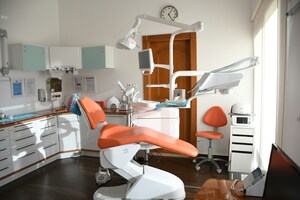Why Regular Dentist Visits Are Vital for Your Oral and Overall Health
منشور من طرف james Morco
الجسم
Many people tend to skip routine dental check-ups, only visiting a dentist when there's an apparent issue. However, regular visits to the Rouse hill dentist play an essential role in preventive care, early detection of health issues, and maintaining confidence with a healthy smile.
In addition to cleaning, preventive care also involves other treatments like fluoride applications and dental sealants. Fluoride strengthens the teeth, making them more resistant to decay, while sealants can protect the grooves of the molars in children, helping prevent cavities. By visiting a dentist regularly, you can prevent minor issues from turning into major problems.
Another serious condition that dentists check for is oral cancer. During routine exams, dentists look for signs like unusual sores, red or white patches, or lumps in the mouth. Early detection of oral cancer greatly increases the chances of successful treatment. Regular visits allow dentists to monitor changes over time, giving patients a significant advantage in addressing health concerns before they worsen.
The mouth often serves as a mirror of the body's health. Issues like dry mouth, bad breath, and sores can be signs of broader health concerns such as gastrointestinal disorders, chronic infections, or nutrient deficiencies. Dentists are trained to recognize these signs and may recommend that patients consult with a physician if necessary, helping identify health issues early.
Additionally, maintaining fresh breath and preventing issues like tooth discoloration or chipped teeth contribute to greater confidence. Addressing these concerns proactively can have a lasting positive effect on one’s self-image, promoting a more vibrant, healthy smile.
Visiting a dentist regularly is more than just a routine task; it’s an investment in your health, well-being, and confidence. Routine cleanings and exams prevent the buildup of plaque and tartar, detect potential health issues early, and provide treatments that keep your smile healthy. A commitment to oral health not only preserves your teeth but also enhances your quality of life. Don’t wait until you’re in pain—schedule a check-up today to keep your mouth and body healthy for the long term.
Preventive Care and Routine Cleanings
The foundation of good dental health is preventive care. Routine dental visits typically include professional cleanings, which remove plaque and tartar buildup that daily brushing and flossing can’t entirely eliminate. Plaque is a sticky film of bacteria that constantly forms on teeth. When left unchecked, it hardens into tartar, which can only be removed by a dental professional. Over time, tartar buildup can lead to cavities and gum disease, which can become severe if untreated.In addition to cleaning, preventive care also involves other treatments like fluoride applications and dental sealants. Fluoride strengthens the teeth, making them more resistant to decay, while sealants can protect the grooves of the molars in children, helping prevent cavities. By visiting a dentist regularly, you can prevent minor issues from turning into major problems.
Detecting Oral Health Problems Early
Regular dental check-ups are crucial for early detection of oral health issues, which can often develop without noticeable symptoms. One common example is gum disease, which can lead to tooth loss and bone damage if untreated. Gingivitis, the early stage of gum disease, is reversible with timely treatment. However, if it progresses to periodontitis, the damage can be long-lasting, and in severe cases, it may require surgical intervention.Another serious condition that dentists check for is oral cancer. During routine exams, dentists look for signs like unusual sores, red or white patches, or lumps in the mouth. Early detection of oral cancer greatly increases the chances of successful treatment. Regular visits allow dentists to monitor changes over time, giving patients a significant advantage in addressing health concerns before they worsen.
The Connection Between Oral Health and General Health
Oral health is directly linked to overall health. For instance, gum disease has been associated with systemic conditions such as heart disease, diabetes, and even respiratory infections. Inflammation from gum disease can contribute to cardiovascular problems, as bacteria from the mouth can enter the bloodstream, potentially leading to plaque buildup in the arteries. People with diabetes also need to be extra vigilant with oral care, as they’re more susceptible to infections, including periodontal disease.The mouth often serves as a mirror of the body's health. Issues like dry mouth, bad breath, and sores can be signs of broader health concerns such as gastrointestinal disorders, chronic infections, or nutrient deficiencies. Dentists are trained to recognize these signs and may recommend that patients consult with a physician if necessary, helping identify health issues early.
Enhancing Confidence with a Healthy Smile
Oral health plays a big role in self-esteem and confidence. A bright, clean smile can improve first impressions, which is important in both personal and professional settings. Dental professionals offer a range of cosmetic treatments, such as teeth whitening, veneers, and orthodontic adjustments, which can improve the appearance of one’s smile.Additionally, maintaining fresh breath and preventing issues like tooth discoloration or chipped teeth contribute to greater confidence. Addressing these concerns proactively can have a lasting positive effect on one’s self-image, promoting a more vibrant, healthy smile.
Conclusion
Visiting a dentist regularly is more than just a routine task; it’s an investment in your health, well-being, and confidence. Routine cleanings and exams prevent the buildup of plaque and tartar, detect potential health issues early, and provide treatments that keep your smile healthy. A commitment to oral health not only preserves your teeth but also enhances your quality of life. Don’t wait until you’re in pain—schedule a check-up today to keep your mouth and body healthy for the long term.











تعليقات